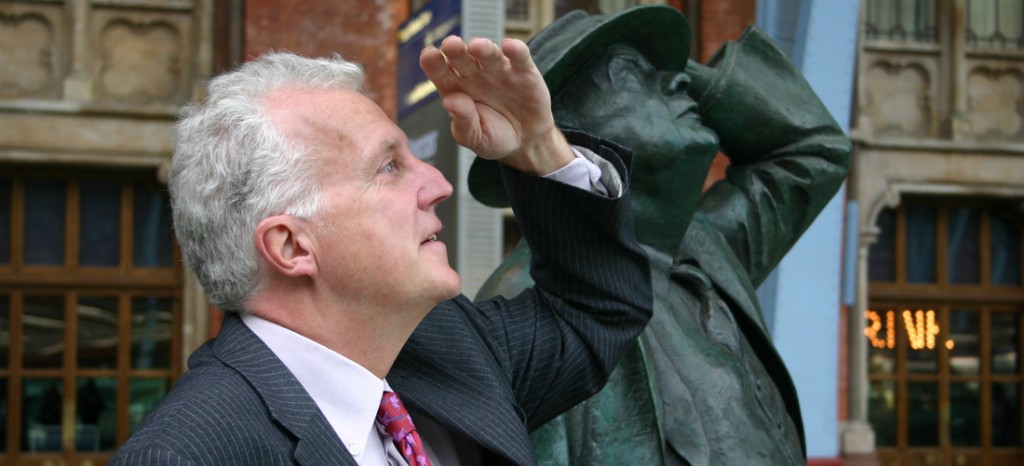They were talking about Boris Island on Radio 5 the other day. We’ve already got Boris bikes, the tortuously alliterative alternative to Barclays Bikes, which presumably the sponsor had hoped would be common parlance, and even Boris buses, the replacement for Routemasters that will supposedly bring back conductors, but Boris Island? That really does seem a little over the top. After all, it is, in fact a plan for an airport, a whopping great big airport in fact, stuck out somewhere on the Thames Estuary, way beyond the area under the control of the mayor of London. It’s hardly going to be called Boris Johnson international – John Lennon will spin in his grave.
It was in the news because apparently David Cameron thought the idea was worthy of consideration, but hold on a sec, is this really right. Well Boris said so, the Daily Telegraph intimated that Cameron was on side and that was picked up by the other papers, but this is a long way from any government endorsement of the scheme.
Yes, the Department for Transport is starting a consultation process on the future of aviation, and particularly of airport capacity in the Southeast, in the spring but the London mayor’s vision of a new airport on the Isle of Grain is fraught with more obstacles than Aintree racecourse.
Boris has form on grands projets He likes to espouse them without much previous thought, to grab the headlines and suggest that he is dynamic but often then gets into trouble over the details. He has, for example, endorsed the idea of a branch off the Northern Line costing around £600m to serve the proposed development at Battersea Power Station. He even persuaded George Osborne to give the scheme a boost by mentioning it prominently in the Autumn Statement, only for, two days later, the developers to collapse putting in doubt the whole project. As, too, with other ideas emanating from Boris Office, the plan had never been properly funded as it was supposed to be private sector financed but only about a third of the cost had been promised.
With Boris Island, though, any rational analysis would soon knock the idea on the head. London, according to the Department’s own previous Aviation White Paper, does not need two hub airports. Therefore, Heathrow would have to be closed down, or reduced to catering to low cost and charter airlines. That is not going to happen.
Therefore, even to the most ambitious and creative imagination, Boris Island is not set to join Boris bikes and buses as a memorial to the tousle-haired mayor. Like many of these ideas, such as the cable car over the Thames which goes from nowhere much to nowhere much, the idea of a new airport out in the shifting Kent sands has not been set in the wider context of transport or planning policy. On the face of it, the idea that it would link easily with HS1 and that access would principally be by rail is appealing. So is the fact that, as we all know, Heathrow is in the wrong place, as having planes fly constantly over the capital – I can hear one now, and I live in North London 15 miles away – is both a risk and a nuisance.
However, it is too late to move it. The whole orientation of the capital would have to change. The implications of Boris Island – or rather the Thames Estuary airport to give its proper name – for the capital are so huge that it is difficult to know where to begin. Heathrow employs 76,000 people directly and perhaps three or four times that indirectly? An airport is not just a couple of runways plonked out on empty land but a major industry requiring vast support structures. Thousands of companies, ranging from aviation engineers to US pharmaceutical firms have located near the airport. Where would they relocate? Do not be beguiled by the idea of rail access. An estuary airport would require massive new road infrastructure to support it, just as in Hong Kong, which though linked by an underground line, required a major new bridge..
Then there’s the birds – but far too much attention is focussed on them. It is the sheer practicalities and cost that ensure this will never happen. So Cameron’s supposed interest is merely a bit of spin. Not only does it offer the opportunity to help the mayor in his electoral campaign, it has the advantage, too, of annoying his deputy prime minister Nick Clegg since the Libdems are opposed to the idea. Cameron’s stated interest therefore is merely a bit of political spin. It costs nothing, except creating a bit of uncertainty among many businesses, to say they are looking at the idea but like Foulness, Maplin Sands and all the other airport ideas,
Talking with a senior railway executive the other day, I was struck by his emphasis on this country’s disastrous absence of any overall planning framework, and he contrasted this with his experience of the Netherlands where everything fits into an overall scheme. In a society that was more confident of its direction and aims, a crazy idea like a Thames Estuary airport would simply be immediately laughed out of court. That is precisely what will happen with Boris Island, but not before it has been used to gain some political capital for its main promoter.
